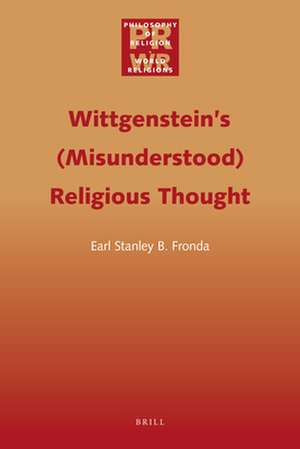Wittgenstein’s (Misunderstood) Religious Thought: Philosophy of Religion - World Religions, cartea 1
Autor Earl Stanley B. Frondaen Limba Engleză Hardback – 12 aug 2010
Preț: 705.31 lei
Preț vechi: 860.13 lei
-18% Nou
Puncte Express: 1058
Preț estimativ în valută:
135.00€ • 146.69$ • 113.48£
135.00€ • 146.69$ • 113.48£
Carte indisponibilă temporar
Doresc să fiu notificat când acest titlu va fi disponibil:
Se trimite...
Preluare comenzi: 021 569.72.76
Specificații
ISBN-13: 9789004186095
ISBN-10: 9004186093
Pagini: 242
Dimensiuni: 155 x 235 x 23 mm
Greutate: 0.52 kg
Editura: Brill
Colecția Brill
Seria Philosophy of Religion - World Religions
ISBN-10: 9004186093
Pagini: 242
Dimensiuni: 155 x 235 x 23 mm
Greutate: 0.52 kg
Editura: Brill
Colecția Brill
Seria Philosophy of Religion - World Religions
Cuprins
Volume Foreword
Preface
Acknowledgement
List of Initials and Abbreviations Introduction
Chapter One Wittgenstein’s Religious Point of View
I. To take or not to take Wittgenstein’s remark at face value
II. Mysticism as Wittgenstein’s religious point of view
III. The merits of positing mysticism as Wittgenstein’s religious point of view
Chapter Two The Theology of the Early Wittgenstein
I. The mystical Wittgenstein
II. Wittgenstein’s apophaticism
III. The Pseudo-Dionysian theology
IV. Wittgenstein’s theology is Pseudo-Dionysian
Chapter Three The Mature Wittgenstein on (Religious) Language
I. On language
II. On the limits of language
III. The trouble with speaking of the unspeakable
IV. On Religious Language
Chapter Four The Mature Wittgenstein on seeing and (not) Speaking of God
I. Speaking of the mind
II. Speaking of God
III. Some objections
IV. Wittgenstein à la St. Thomas Aquinas
V. Seeing God
Chapter Five ‘God exists’ after Wittgenstein after St. Thomas Aquinas
I. ‘God exists’ after Wittgenstein
II. God exists as a grammatical hinge
III. St. Thomas Aquinas on ‘God exists’
IV. Wittgenstein à la St. Thomas
Chapter Six Wittgenstein on the (Supposed) Evidence for God’s Existence
I. On miracles as evidence of the divine
II. On religious experience as evidence of the divine
III. The orderliness of the universe as evidence of the divine
IV. Faith creates the evidence that justifies faith
Chapter Seven Wittgenstein’s Religious Realism with Attitude
I. Cupitt’s idealist Wittgenstein
II. From behaviourism to religious non-realism
III. Wittgenstein’s anti-realism and his realist attitude
IV. Realism/non-realism and Wittgenstein’s God
V. ‘God’ and ‘colour’
VI. Apophatic theology and God-universe bi-conditionality
Chapter Eight Wittgensteinian Philosophy of Religion is misunderstood
I. The criticisms against Wittgensteinian philosophy of religion
II. Two discursive traditions about God as (not) a being
III. Wittgenstein in line with the Plotinian tradition
IV. The criticisms are borne of nescience or obliviousness
Chapter Nine Concluding remarks: The difference it makes
in understanding Wittgenstein’s religious point of view
I. Wittgenstein’s religious point of view and other non-religious matters
II. Wittgenstein’s religious point of view and the conduct of philosophy of religion
III. Concluding remarks on non-realism, crypto-atheism and fideism
Bibliography
Index
Preface
Acknowledgement
List of Initials and Abbreviations Introduction
Chapter One Wittgenstein’s Religious Point of View
I. To take or not to take Wittgenstein’s remark at face value
II. Mysticism as Wittgenstein’s religious point of view
III. The merits of positing mysticism as Wittgenstein’s religious point of view
Chapter Two The Theology of the Early Wittgenstein
I. The mystical Wittgenstein
II. Wittgenstein’s apophaticism
III. The Pseudo-Dionysian theology
IV. Wittgenstein’s theology is Pseudo-Dionysian
Chapter Three The Mature Wittgenstein on (Religious) Language
I. On language
II. On the limits of language
III. The trouble with speaking of the unspeakable
IV. On Religious Language
Chapter Four The Mature Wittgenstein on seeing and (not) Speaking of God
I. Speaking of the mind
II. Speaking of God
III. Some objections
IV. Wittgenstein à la St. Thomas Aquinas
V. Seeing God
Chapter Five ‘God exists’ after Wittgenstein after St. Thomas Aquinas
I. ‘God exists’ after Wittgenstein
II. God exists as a grammatical hinge
III. St. Thomas Aquinas on ‘God exists’
IV. Wittgenstein à la St. Thomas
Chapter Six Wittgenstein on the (Supposed) Evidence for God’s Existence
I. On miracles as evidence of the divine
II. On religious experience as evidence of the divine
III. The orderliness of the universe as evidence of the divine
IV. Faith creates the evidence that justifies faith
Chapter Seven Wittgenstein’s Religious Realism with Attitude
I. Cupitt’s idealist Wittgenstein
II. From behaviourism to religious non-realism
III. Wittgenstein’s anti-realism and his realist attitude
IV. Realism/non-realism and Wittgenstein’s God
V. ‘God’ and ‘colour’
VI. Apophatic theology and God-universe bi-conditionality
Chapter Eight Wittgensteinian Philosophy of Religion is misunderstood
I. The criticisms against Wittgensteinian philosophy of religion
II. Two discursive traditions about God as (not) a being
III. Wittgenstein in line with the Plotinian tradition
IV. The criticisms are borne of nescience or obliviousness
Chapter Nine Concluding remarks: The difference it makes
in understanding Wittgenstein’s religious point of view
I. Wittgenstein’s religious point of view and other non-religious matters
II. Wittgenstein’s religious point of view and the conduct of philosophy of religion
III. Concluding remarks on non-realism, crypto-atheism and fideism
Bibliography
Index
Notă biografică
Earl Stanley B. Fronda, Ph.D. in Philosophy, University of Wales, is Associate Professor at the Department of Philosophy, College of Social Sciences and Philosophy, University of the Philippines in Diliman, Quezon City.








